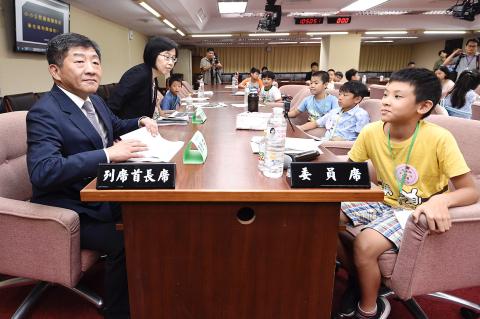Minister of Health and Welfare Chen Shih-chung (陳時中) yesterday apologized for a dengue fever alert that was mistakenly sent to mobile phone users nationwide on Tuesday.
The alert was sent at about noon, warning residents of Tainan’s Kaishan Borough (開山) of an indigenous dengue fever outbreak in the area.
The message, signed by the Tainan City Government and the Centers for Disease Control, asked residents to take measures to prevent mosquito bites, routinely empty water containers and undergo an NS1 antigen test at a hospital should symptoms such as fever, headache, joint pain or rashes appear.

Photo: George Tsorng, Taipei Times
The alert was originally set up to be sent to residents within 300m of the borough, but the unit of distance was later changed to kilometers, Chen said during a visit to a summer camp for children in grades three to six organized by Democratic Progressive Party (DPP) Legislator Lin Shu-fen (林淑芬).
Government agencies have been asked to review the issue and debug the system, he said.
The students were invited to the Legislative Yuan, which is on break, to experience what it would be like to be a lawmaker for a day.
They asked Chen questions about dengue fever outbreak, whether the government would be placing restrictions on sugary drinks, how to reduce the smoking population by half, whether all school lunches have been inspected, the government’s long-term care initiative and other topics.
While government policies are closely related to children, adults seem to refuse to discuss them with children, believing that they would not understand, Lin said.
She organized the camp in the hopes of looking at national policies from a child’s perspective, she said.
The camp, which seeks to help students understand how legislative committees operate, promote civic education and deepen children’s understanding of democracy, is also a realization of children’s right to express their opinion as protected by the Convention on the Rights of the Children, she added.

A strong continental cold air mass is to bring pollutants to Taiwan from tomorrow, the Ministry of Environment said today, as it issued an “orange” air quality alert for most of the country. All of Taiwan except for Hualien and Taitung counties is to be under an “orange” air quality alert tomorrow, indicating air quality that is unhealthy for sensitive groups. In China, areas from Shandong to Shanghai have been enveloped in haze since Saturday, the ministry said in a news release. Yesterday, hourly concentrations of PM2.5 in these areas ranged from 65 to 160 micrograms per cubic meter (mg/m³), and pollutants were

Taiwan’s armed forces have established response protocols for a wide range of sudden contingencies, including the “Wan Chun Plan” to protect the head of state, the Ministry of Defense (MND) said today. After US President Donald Trump on Saturday launched a series of airstrikes in Venezuela and kidnapped Venezuelan President Nicolas Maduro, concerns have been raised as to whether China would launch a similar “decapitation strike” on Taiwan. The armed forces regularly coordinate with relevant agencies and practice drills to ensure preparedness for a wide range of scenarios, Vice Minister of National Defense Hsu Szu-chien (徐斯儉) told reporters before a

EVA Airways on Saturday said that it had suspended a pilot and opened an investigation after he allegedly lost his temper and punched the first officer several times as their plane was taxiing before takeoff at Los Angeles International Airport. According to a report published on Thursday by The Reporter, the incident occurred after the flight’s Malaysian first officer tried to warn the Taiwanese pilot, surnamed Wen (文), that he was taxiing faster than the speed limit of 30 knots (55.6kph). After alerting the pilot several times without response, the first officer manually applied the brakes in accordance with standard operating

The New Taipei City Social Welfare Department on Thursday celebrated Paralympic competitor Chen Tzu-wei (張孜維), who received last year’s national Golden Eagle award for exemplary achievement by Taiwanese with disabilities. Chen, who suffers from childhood-onset muscular dystrophy, did not attend the first award ceremony held by the Ministry of Health and Welfare in November due to illness. Chen was formally presented with the award at the department, where he gave thanks to government workers for supporting his education and livelihood, the department said in a statement. Chen was raised by the Ai-hsin Home for Persons with Disabilities in the city’s Bali District (八里)